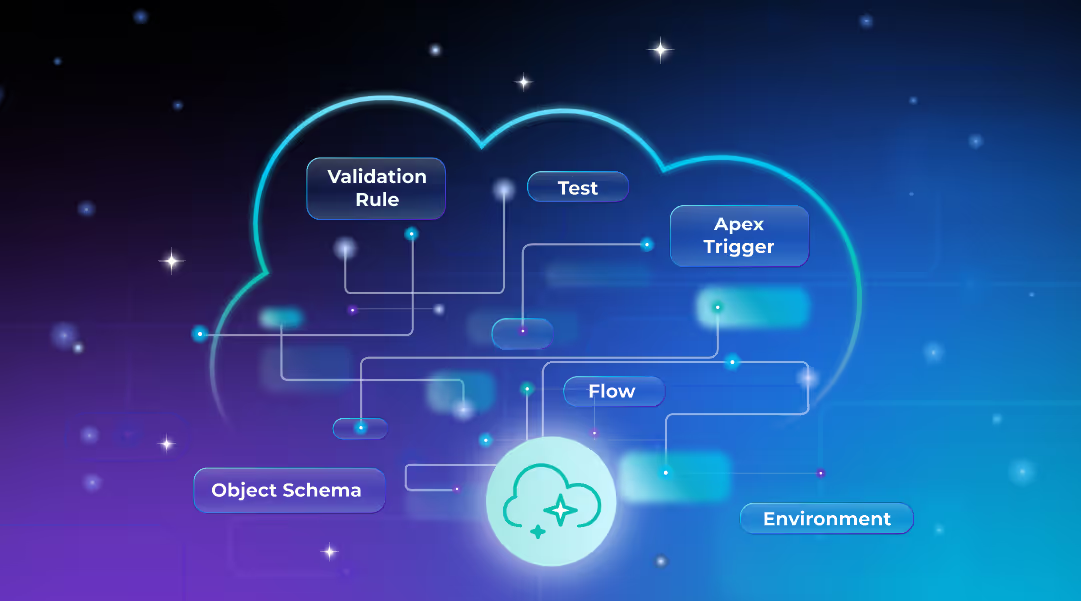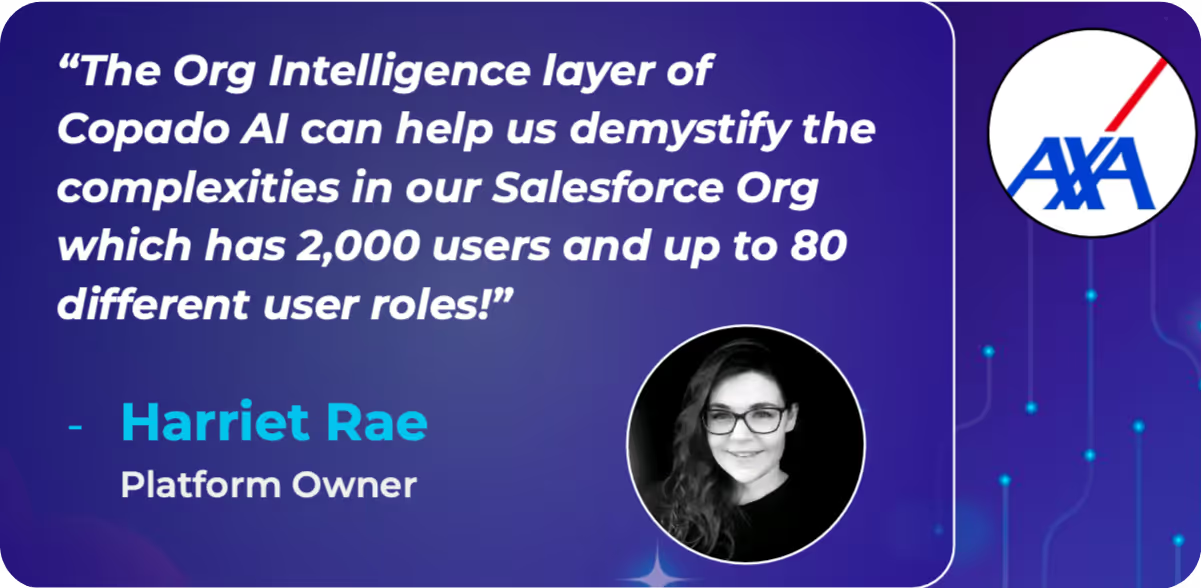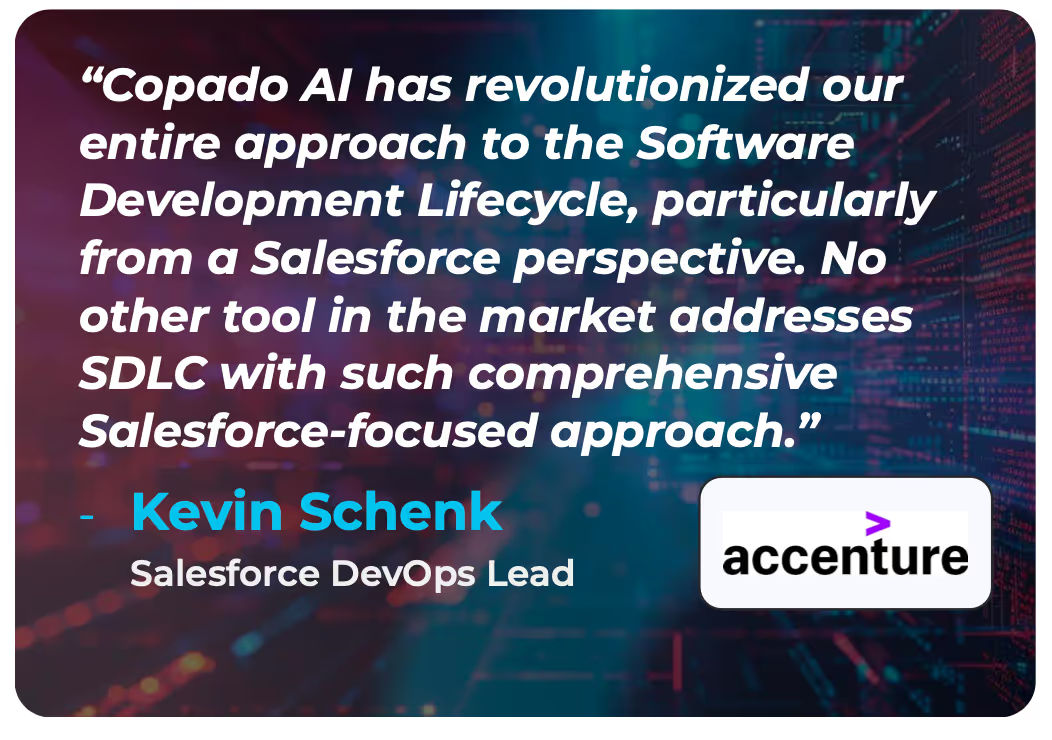

.svg)
.svg)
Can you truly trust your software supply chain to avoid costly, unexpected risks?
Recent research reveals a startling truth: nearly half of 1,500 surveyed executives admit they lack the visibility to fully understand or even identify software development risks. Even more concerning is that only 23% feel they have a clear, comprehensive view.
Salesforce DevOps teams face a daily challenge like trying to solve a 1,000-piece puzzle, but with no picture on the box and lots of identical pieces. Without visibility into your metadata or configuration, every move is a guess, and the stakes are high.
No clear context information on how everything fits together means every change poses risk, potentially leading to costly mistakes, delays, and security holes.
The answer? Org Intelligence™: full visibility into your Salesforce environment.
Read on to discover why context is the key to digital transformation success and how Salesforce DevOps tools like Copado’s Org Intelligence™ empower teams to fix and deploy changes confidently and quickly.
In DevOps, context refers to a detailed understanding of your environment: its configurations, dependencies, workflows, and interconnections. It’s the “big picture” that enables smarter decisions, fewer errors, and stronger collaboration.
Without that context, teams fall into guesswork, redundant work, and costly rework. These problems are magnified in Salesforce DevOps, where complex metadata, customizations, and automations create a highly intricate, interdependent ecosystem.
Salesforce’s layered complexity creates critical challenges:
Salesforce’s low-code approach accelerates development but adds complex layers of metadata and dependencies traditional DevOps tools are just unable to handle.
Without a unified, real-time view, analyzing change impact becomes slow and error-prone, risking your release quality and timelines.
Salesforce orgs are living, evolving systems.
According to the 2023 Benchmark Report on Salesforce Optimization, the average org contains over 24,000 metadata items. That volume of data would take more than four days to review manually.
Meanwhile, our State of Salesforce DevOps report shows change failure rates rising from 23% to 33%, with mean time to recover doubling. This result directly links to the growing complexity of change logistics and deployment.
Even small changes can have unexpected ripple effects across the org. Generic DevOps tools fall short because they lack real-time metadata insights and visibility to manage Salesforce’s complex interconnectedness.
That’s where Salesforce-specific DevOps tools come in. By offering real-time insights into metadata, automations, dependencies, and architecture, they provide the context teams need to deliver safely, efficiently, and at scale.
While generic AI tools may assist with isolated tasks, they usually lack the context, integrations, and specialization necessary to tackle Salesforce DevOps at scale.
That’s where Org Intelligence™, a core capability of the Copado AI Platform, sets itself apart.
Org Intelligence™ gives your team real-time visibility into every corner of your Salesforce org: from metadata and automations to user stories and deployment pipelines. It removes blind spots so your team can deliver high-quality changes faster and with complete confidence.
Unlike many traditional DevOps tools that rely on manual discovery and siloed data, Org Intelligence™ connects directly to your Copado CI/CD environment and Salesforce metadata. It supports over 300 metadata types, from automations and data models to applications.
Even the most skilled Salesforce teams run into roadblocks without full org context.
Missed dependencies, misaligned code, slow org discovery, onboarding delays, and lengthy troubleshooting are all common bottlenecks.
Org Intelligence™ transforms these pains into productivity wins with Copado AI Agents.
Continuously updated, they integrate with your org’s metadata, architecture, user stories, and more. This feature means that all AI-generated outputs–be it a code snippet or fix–will account for your environment’s real conditions.
Collaborative Workspaces, gathering SOPs, metadata insights, and updates into one place.
Results? Smarter decisions, faster delivery, and fewer surprises.
Let’s now focus on these benefits in detail.
Here are the four most important benefits you can reap with Copado’s Org Intelligence™ :
Copado Org Intelligence™ translates hours of manual investigation into clear insights. Business analysts, devs, and admins get comprehensive, real-time visibility into org metadata and automations thanks to intuitive diagrams and detailed explanations, all within one platform.
Developers no longer write boilerplate or guess how code fits into the org. Copado AI produces code that references existing metadata, adhering to best practices, and passing unit tests automatically.
Meanwhile, business analysts receive user stories that precisely capture requirements, bridging business and technical teams.
When problems arise, Copado’s AI agents rapidly analyze metadata relationships and deployment pipelines to identify root causes. This targeted insight reduces downtime and unblocks releases far faster than traditional troubleshooting.
In many cases, this ability enables teams to proceed from crisis to deployed solution in less than 30 minutes!
By shifting quality processes left and embedding org context throughout the development cycle, Copado minimizes rework. Teams deliver continuous, high-quality changes with confidence, turning stressful release days into a thing of the past.
Copado Org Intelligence™ reduces risk and shortens time-to-value by translating strategic goals into safe, trackable technical execution. Consequently, you can make business-critical changes with clarity instead of guesswork.

Thanks to unprecedented org visibility, Salesforce DevOps teams can automate smarter with AI-generated user stories and code, collaborating more effectively across business and technical teams.

Org Intelligence™ enables eliminating repetitive tasks, reducing failed deployments, and resolving issues faster. It empowers Salesforce Devs and Admins teams to build smarter, test earlier, and ship confidently–with fewer blockers and more time to innovate.
Activating Org Intelligence™ is simple:
Once you connect your Salesforce org to the Copado AI Platform, you’ll access your real-time metadata, automations, user stories, and deployment insights in one place.
You can use this data to immediately:
To unlock the full value of Org Intelligence™, apply these best practices:
Context is no longer optional: it’s the foundation of fast, safe, and scalable change delivery in complex Salesforce environments.
Copado Org Intelligence™ brings that context into every stage of your DevOps process by connecting AI directly to your org’s metadata, automations, and pipelines.
The result? Fewer failures. Faster releases. No more guesswork or release-day chaos.
Ready to stop guessing and start delivering with confidence? Unlock the power of org-aware Salesforce DevOps today:
Schedule a demo / Start Your Free Trial
Context refers to a detailed understanding of your Salesforce org’s metadata, dependencies, and automations. It’s essential for the speed and confidence of all fixes and deployments.
Salesforce DevOps tools like Copado’s AI Platform use context as information to avoid guesswork, reduce errors, and speed up change impact analysis, enabling faster, safer releases.
Salesforce orgs are complex with thousands of metadata items and intricate interdependencies. Without Org Intelligence™, teams struggle with low visibility, manual reviews, knowledge silos, and slow troubleshooting.
Org Intelligence™ delivers real-time insights, helping teams anticipate the impact of each change, generate accurate user stories, and resolve issues quickly.
By integrating directly with Salesforce metadata and deployment pipelines, Org Intelligence™ automates org discovery, user story generation, issue resolution and code validation. This reduces manual work, cuts issue resolution time, and minimizes rework, letting your Salesforce DevOps teams deliver fixes faster and with greater confidence.
Explore our DevOps resource library. Level up your Salesforce DevOps skills today.

.avif)


.svg)
